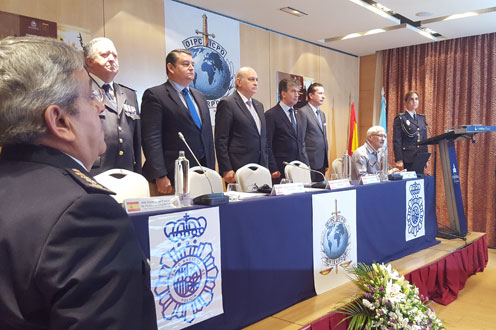"The State Pact against international terrorism has allowed us to increase citizen security", says Jorge Fernández Díaz
News - 2015.11.18
In his initial address at the meeting, where he was accompanied by the Director-General of the Police, Ignacio Cosidó, Jorge Fernández Díaz wished to "reaffirm all the support, warmth and friendship that the Government of Spain and all the Spanish people feel for Paris, France, above all for those who have lost loved ones in the terrible terrorist attacks of Friday, 13 November, and in particular our dead compatriots Juan Alberto González Garrido, Manuel Pérez Paredes and Michelle Gill Jaimez".
The Minister for Home Affairs stressed that Spain has extensive experience in the fight against both domestic and international terrorism. "A long and tough fight with irreparable consequences that include the loss for ever of those who are killed, but a fight against terrorism that is always won in the end by the rule of law". In this respect, he highlighted the solid political and social commitment in place, as well as the unceasing police and judicial actions which, together with international cooperation, have helped put an end to the "defeated ETA and will also serve to defeat Jihadi terrorism".
165 held in 68 police operations against Jihadi terrorism
Jorge Fernández Díaz highlighted that since the government came to power, 68 police operations have been carried out against the Jihadi environment which have led to 165 people being arrested. He also highlighted that so far in 2015 there have been 36 operations with a total of 90 detained, twice the figure for the whole of 2014.
The Minister for Home Affairs added that "with the conviction that absolute security is impossible and that no-one is safe from terrorist action, the government has decreed a Level 4 alert, based on analysis by specialists, to make people aware that we are calmly at work and resolutely prepared with all the mechanisms necessary to prevent terrorist attacks that strike wherever they can".
Jorge Fernández Díaz pointed to the global nature of the terrorist phenomenon, which "uses spaces of freedom such as the Internet and the social networks to radicalise and recruit followers". In addition, he stressed its multi-faceted profile where unlike traditional terrorism, "foreign fighters are becoming increasingly common; those who return home or solitary actors that can act indiscriminately or prepared down to the last detail as demonstrated in Paris". Specifically he reported that 139 Spanish people have moved to conflict zones and 25 of them have returned.
To tackle this phenomenon, the Minister for Home Affairs has stressed the importance of "staying strongly united in defence of our values and our democracy". One result of this union, he noted, has been the success of the State Pact against international terrorism signed in February 2015 between the President of the Government and the Leader of the Opposition. This is an agreement that, according to Jorge Fernández Díaz "is in excellent health and has allowed us to adapt the Criminal Code to the new characteristics of Jihadi terrorism, and with it to increase the security of our citizens".
In this struggle against "barbarism", Jorge Fernández Díaz also stressed the need to continue to increase police effectiveness and step up international collaboration to the highest levels, as is the case of this meeting held today in Seville. He highlighted that Spain will continue with its "unquestionable commitment" in the struggle against terrorism in all existing forums: Interpol, the Anti-DAESH Coalition, the Global Anti-Terrorist Forum, the G-20, the EU Justice and Home Affairs Councils, the G-10 and the G-6.
Jorge Fernández Díaz ended his speech with a message of hope and stated that "freedom and security need and reinforce each other; there is no real freedom if we do not achieve high levels of security for our citizens".
Detecting and impeding recruitment
The aim of the working-group meeting starting today is to share information between country members about foreign terrorist fighters and the networks that have been detected so far, and about the mechanisms that can be effective to detect and prevent recruitment and movement of these people and facilitate their activities, through the exchange of experience and information on specific cases.
The meeting will include further discussion on how the police can gather information through social networks on foreign terrorist fighters. Another of the key issues will be the discovery and dismantlement of the networks engaged in organising and facilitating travel, in particular reflecting the type of arrangements revealed in recent or current cases.
Also being studied will be the involvement of fighters in terrorist actions or other criminal activities when they return to their home countries, and how law enforcement agencies and judicial authorities treat crimes committed in conflict zones abroad. Another of the issues to be tackled is that of foreign fighters in terrorist attacks committed outside conflict zones, including those committed by people who are frustrated because they have not been able to travel to these zones.





